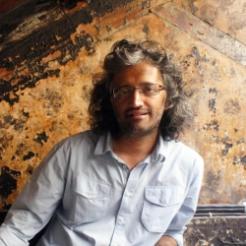Amnesty International has used an art installation at its UK offices to call on the London Olympic Organising Committee to apologise for procuring goods from a company which is connected to an on-going legal dispute in India over a chemical leak.
The multi-sensory installation created by Indian artist Samar Jodha (pictured) recreates the Bhopal disaster of 1984, when toxic gas leaked from a pesticide factory in Bhopal killed between 7,000 and 10,000 people immediately. A further 15,000 people have died over the last 25 years, with the contaminated site "affecting the human rights of more than 100,000 people", according to Amnesty International.
Dow Chemical, which now owns the company responsible for the leak, is a global Olympic sponsor and also provided a fabric wrap for the Olympic Stadium.
Street artist, Pure Evil, has also painted a sign on Amnesty’s building in Shoreditch which says: “Don’t Poison our Olympics; Tell Lord Coe to stop defending Dow.” (Click on the thumbnail below to see).
Amnesty is calling on the public to contact Lord Coe, who is head of Locog, asking him to retract the committee’s defence of Dow and examine the procurement process that led to Dow being awarded the contract to provide the fabric wrap to the Stadium.
Peter Frankental, economic relations programme director at Amnesty International UK said: “Surely Locog should recommend that future Olympic hosts consider the human rights record of a sponsor, so that this sort of shameful association does not happen again. That would be a fitting legacy for the London Games.”
In a letter responding to Amnesty, Lord Coe said: “We do not dispute that there are issues outstanding in Bhopal particularly in relation to the remediation of the site, however as we understand it these outstanding issues are not the responsibility of Dow Chemical Company.”
Dow bought Union Carbide Corporation (UCC) in 2001, which at the time of the disaster had a 51 per cent share holding in Union Carbide India Limited (UCIL), which owned and ran the factory was responsible for the leak. UCC had sold its shares in UCIL in 1994.
Coe added that: “Having carefully looked into this issue and based everything we know and have seen from Dow, we stand behind them as a worldwide sponsor of the Olympic movement and as a supplier to Locog. We also stand by our procurement processes by which we award our contracts.”









